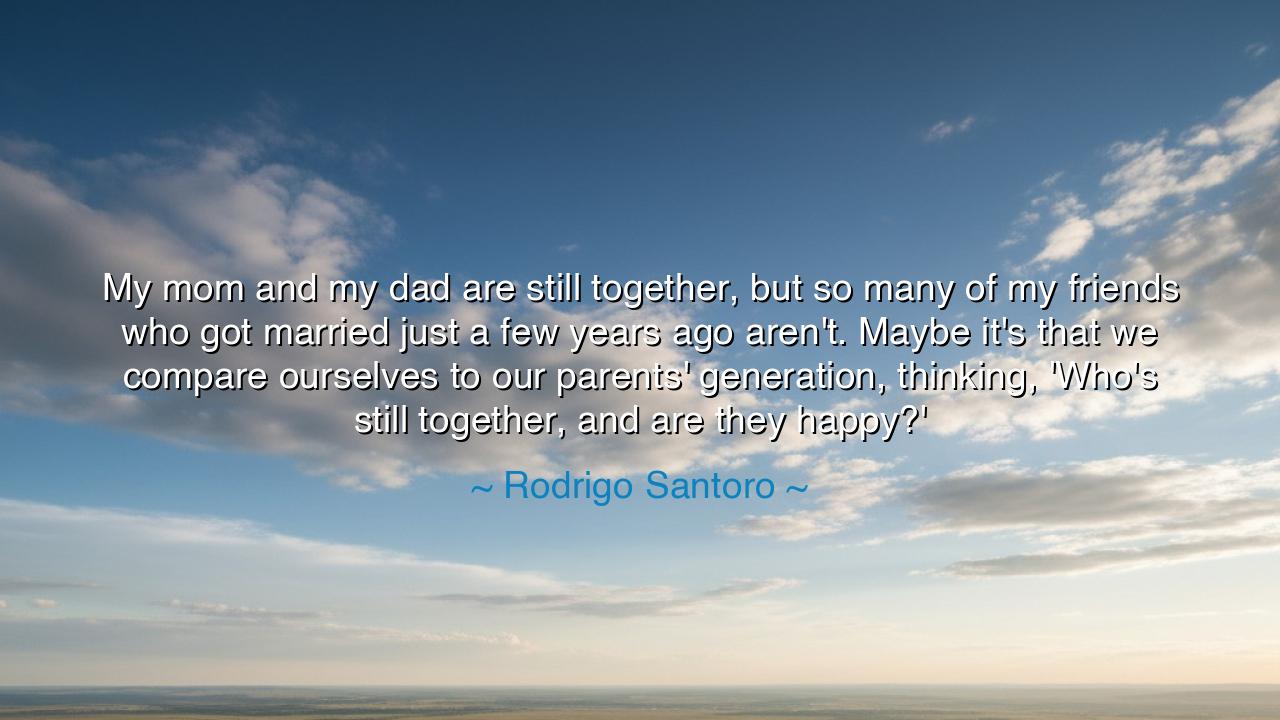
My mom and my dad are still together, but so many of my friends
My mom and my dad are still together, but so many of my friends who got married just a few years ago aren't. Maybe it's that we compare ourselves to our parents' generation, thinking, 'Who's still together, and are they happy?'






The words “My mom and my dad are still together, but so many of my friends who got married just a few years ago aren't. Maybe it's that we compare ourselves to our parents' generation, thinking, 'Who's still together, and are they happy?'” were spoken by Rodrigo Santoro, a man reflecting not merely on the state of love, but on the transformation of human commitment across generations. Beneath his gentle observation lies a question that haunts the modern heart: why do bonds that once seemed eternal now fracture so easily? His words are not a judgment, but a meditation — a recognition that love, once understood as endurance through struggle, is now tested in a world that prizes freedom above permanence, emotion above effort.
To say “My mom and my dad are still together” is to utter a rare phrase in an age of impermanence. It calls forth an image of constancy — of two souls who weathered the storms of time and remained. Yet Santoro’s reflection does not rest in nostalgia; he asks, too, whether those who remain are truly happy. Thus, his question is double-edged: it acknowledges both the strength of the old bonds and the honesty of the new. The ancients would say that every generation must redefine what it means to love — that each age must forge its own covenant between the heart and the world. And so, his words become a mirror for our time, asking us whether we have lost the art of endurance, or merely shed the pretense of it.
In the era of Santoro’s parents, marriage was often seen as a sacred duty, a union upheld not only by love but by necessity, culture, and shared purpose. To part was unthinkable, to persevere was noble. Love was not measured by comfort, but by constancy. The hardships of life — poverty, distance, misunderstanding — were not reasons to end love but trials to deepen it. The philosopher Marcus Aurelius once wrote, “Endure and renounce.” To the ancients, this was not cruelty but discipline — the understanding that devotion is forged in endurance, and that joy without struggle is shallow as mist upon water.
Yet in the modern age, freedom has become our guiding star. We no longer see love as duty, but as choice; not as endurance, but as expression. We seek not merely partnership, but happiness — a happiness that is personal, individual, ever-changing. And therein lies both our strength and our sorrow. We are freer than our parents, yet less certain; more honest, yet less patient. Santoro’s reflection, “Maybe it's that we compare ourselves to our parents' generation,” captures this tension between admiration and doubt. We look back and see constancy, but we also see sacrifice. We look forward and see honesty, but we also see fragility. The balance between the two — that is the task of our generation.
History tells us of lovers who endured distance, war, and fate to remain bound by devotion. Penelope, wife of Odysseus, waited twenty years for her husband to return from Troy. She wove by day and unraveled by night, defying the world with faith in love’s endurance. But it is worth remembering that her love was not blind; it was active, intelligent, full of patience and purpose. She endured not because she had no choice, but because she believed in something greater than herself. So too, perhaps, must modern love rediscover the difference between blind endurance and meaningful perseverance — between staying for comfort and staying for truth.
Santoro’s words invite us to look inward. Do we love as our parents did — steadfast and unquestioning? Or do we love as our generation teaches — free, but fleeting? The answer lies not in rejecting one or the other, but in uniting wisdom with authenticity. From our parents we can learn commitment, from ourselves we can learn honesty. For love must be both a promise and a choice, renewed daily by the will to care, even when passion fades and comfort is tested. Without the courage to endure, love is a spark that dies in the wind; without freedom and truth, it is a fire that burns without warmth.
The lesson, then, is timeless: love is neither the old endurance without joy, nor the new freedom without depth. It is the art of staying through change — of choosing again and again, even when the easy path is to walk away. To love well is to remember that happiness is not constant delight, but shared struggle; not perpetual excitement, but mutual growth. And so, when you look at the generations before and after you, do not compare — learn. Take from the past its strength, and from the present its honesty. Build a love that is both free and faithful, fragile and fierce.
For in the end, as Santoro reminds us, it is not the length of love that matters, but its truth. Whether we stay or part, endure or evolve, let it never be said that we loved carelessly. Let our memories, like those of our parents, be worthy of remembrance — a testament that in every age, the heart still dares to hope, still dares to belong, still dares to love.






AAdministratorAdministrator
Welcome, honored guests. Please leave a comment, we will respond soon